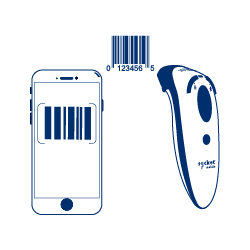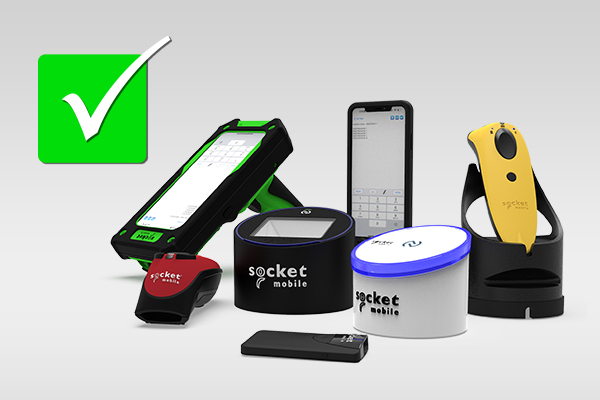Camera-Based Scanner vs. Bluetooth Barcode Scanner
Camera-based scanning utilizes the camera within your mobile device to collect data, while Bluetooth barcode scanning requires an external scanning device.
Knowing which solution is suitable for your business can come down to the benefits and attributes that each scanner offers, and how they can attribute to your daily workflow. Use the comparison guide below to help evaluate the pros and cons of each and find the scanning solution that best fits your needs.

Traditional Camera-Based Scanning

Summary
Using the phone's camera is a good solution for general-purpose usage such as price checking or scanning a QR code.
Pros
- Set-up - Virtually no set up if required barcodes are supported.
- Cost - No need to pay for new scanners. Purchasing multiple barcode scanners can be costly.
- Photo-ability - Take pictures and attach them directly to data for timely problem solving.
- Multitasking - Perform multiple functions such as taking a picture, passing images to applications, notating date & time and passing quantities.
- Anytime Scanning - Smartphones are carried by most people and go everywhere. Scan on the go without carrying a scanner.
- Storage - If a network is not available, you can store the barcodes into the phone to send later.
Socket Mobile's SocketCam family of camera-based scanners are more efficient than traditional built-in phone or tablet scan technology. See our extended list of SocketCam benefits.
Cons
* The SocketCam C860 overcomes some of the traditional camera-based scanners cons noted below.
- Scanning Ability* - Limited read range.
- Speed* - Slow scanning capabilities, especially in difficult lighting conditions.
- Battery Life - Powering the screen and running applications on the OS while scanning drains the phone's battery more quickly.
- Ergonomics - Smartphones/devices, although ergonomic to a certain degree, are NOT designed for the specific purpose of camera/barcode scanning.
- Weight - Phones are heavy and not designed for repetitive scanning motions and angles.
- Agility - Smartphones/devices are less agile, and more cumbersome.
- Scanning Process - Requires an element of focusing, with a viewfinder on top of the application and moving the device into range for camera.
- Security - Data scanned on a device opens the opportunity for information to be shared outside. BYOD requirement makes it even easier for confidential info to leak.
- Total Cost of Ownership - A barcode scanner has a longer lifespan. It does not rely on the latest technology to operate, therefore, won't require replacement as often as a smartphone.
- Replacement Cost - Smartphones can be easily damaged while scanning. The replacement is more costly than a dedicated barcode scanner. Even with protective cases/enterprise sleds, smartphone screens can easily crack, which is expensive to repair and can make the device unusable.
- Lost Productivity - If the smartphone breaks before transferring data, the data will need to be rescanned.
- Operating System Updates - Smartphones require regular software and OS updates; barcode scanners do not.
- Limited Scanning - Not ideal for more than 20 scans per day.
Bluetooth Barcode Scanners

Summary
A dedicated barcode scanner is the best for large quantities of scanning, efficiency and cost-effectiveness.
Pros
- Performance - Barcode scanners are intended for a single purpose making them faster and more reliable than a smartphone.
- Read Range - Reading range on a scanner is greater than a phone, allowing you to scan a variety of barcode sizes and distances.
- Ergonomics - Socket Mobile hardware readers are designed to be extremely ergonomic and be comfortable in the hand for a full day's scanning.
- Weight - Scanners are lightweight, minimizing wrist movement and protecting the user from heavy repetitive motions.
- Agility- Hardware readers are agile and able to get into small spaces if needed.
- Scanning Process - Hardware readers are aim and fire, and do not require as much time to focus.
- Battery Life - Barcode scanners have sleep modes and are only "on" when pulling the trigger or reading a barcode. Battery life is considerably longer than a smartphone.
- Integration - Scanner doesn't require any drivers or specific software to use with a computer.
- Security -Since scanners are not designed to store or share data, there is minimal danger of a data breach. You cannot download data-altering apps or other software onto the scanner.
- Cost Efficiencies - Scanners are single-purpose devices, less complex and less expensive to buy and maintain.
- Total Cost of Ownership - Barcode scanners do not rely on the latest technology to perform and don't need to be replaced as often as a smartphone.
- Replacement cost - Smartphones are not designed to be scanners and can be easily damaged. A barcode scanner is less expensive to replace if broken.
- Extensive Scanning - Great for 100+ scans per day, saving substantial time and comfort.
Cons
- Photo-ability - Barcode scanners can't take pictures.
- External Device - A separate device is required to transmit the scanned data to.
- Charging - Barcode scanners must be charged separately from the host device.
If you are having issues with your data reader, please review our FAQs for a solution.
